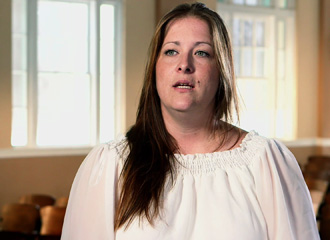This Military Couple Stood Side by Side
3-minute read
This Military Couple Stood Side by Side
3-minute read
Veteran couples can face a unique challenge: How do I manage my own mental health while also supporting my partner?
Identifying Signs and Symptoms
Dusty came home from service in Iraq feeling stressed and on edge. Once he began a civilian job, he worked very long hours. His wife, Teresa, began to notice he was drinking more and more.
“It started with just those big cans of beer,” she says. “And then he would bring home two beers. And then he’d bring home a six-pack. And I want to say about a year after he got out, it had progressed to a 12-pack.”
Teresa knew that Dusty had his demons. They were open and honest about their time in the service long before they were married. So she could understand why he was struggling with his transition to civilian life.
Yet Dusty didn’t think what he was going through was out of the ordinary. As Teresa explains, “I would say something, and of course, you know, the man statement of, ‘Oh, I’m fine. I’m good. … I don’t have a problem. There’s nothing wrong with me. I’m just tired. I'm frustrated with work.’ And, of course, that escalated.”
Then one night, Dusty had a flashback. “If I can lose all sense of control of who I am and what I’m all about in an instant,” Dusty says, “then there’s a serious problem.”
Finding a Road to Recovery
With encouragement from his wife, Dusty called their local VA and began working through his challenges. He went to a VA outpatient program, where a counselor helped him start on the road to recovery. Teresa joined Dusty in group counseling, which helped Dusty realize just how patient and understanding his wife had been in the months leading up to seeking help. Dusty reflects on his experience:
“I’d have to say that group therapy, and being able to talk to somebody [who] really wants to know what’s going on … [who] really wants to help you, and they’re extremely passionate about it … Just knowing that they’re there to help helps you every day.”
It does not make you a weaker person. It makes you stronger because you set pride aside to make sure that your health and well-being are good.Dusty, a U.S. Marine Corps Veteran, on reaching out for support
Beyond VA’s support for Dusty, Teresa decided to set up monthly barbecues in their neighborhood. These gatherings with friends really helped Dusty reconnect with those around him and realize that he was not alone.
“There were these people who live right down the street who were just like him, [who] dealt with the same problems that he had,” says Teresa. “It became something bigger, where now not only does he feel better for himself, but now he’s making a difference in someone else’s life that needed it just as much as he did.”
Therapy, family support, and community engagement continue to help Dusty and Teresa stay strong and live well.

